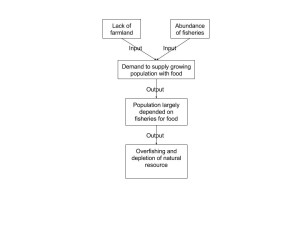1. The personal experience I selected was drawn from my time living and working in Okinawa, Japan. The food choice I selected was the social norm of a diet largely consisting of fish. The social norm of eating fish is directly connected to the environment of Japan. While the trend of eating sushi first appeared as a way to preserve food, there are other environmental factors that add to how this social norm came to be. Specifically, the amount of arable land. A large percentage of land that could be used for grazing is used for rice production. This severely limits the amount of food produced from livestock. Due to this limitation, there is a great reliance on fisheries to meet the demand of the people. The food choice is mainly connected to convenience and the environment.
2. The food choice identified in the first paragraph most heavily relates to the societal issues of hunger and the environment. In terms of the environment, the reliance of fisheries as a food choice in Japan is apparent. Japan is ranked behind China for amount of fish caught. However, the lack of farmland available is in direct correlation with a dependency on fish. Hunger is linked to this food choice for the same reason. In order to meet the depend of the people, social norms related to food developed in far different way than other areas of the world. In addition, the popularity of eating raw fish has a similar origin. Specifically, fuel as it relates to manure from livestock and wood from forests. A shortage of each of these fuel sources can help to explain why raw fish is a norm in the area.


Hi Brenton, my name is Nick Gasparovich. Talking about Japan, really helps show how important the natural environment is for food security. The situation you presented shows that even as a high income country like Japan, they are still one fishing catastrophe away from being in the same situation as Ireland during the potato famine. People tend to believe that wealthier countries don’t have food supply problems, which is false, and this blog proves that. I enjoyed your system diagram, it does a great job of quickly outlining the issue you are trying to highlight. Check out my blog at http://geog030.dutton.psu.edu/2016/02/29/module-6-nick-gasparovich/
Hi, I’m Jim. Here’s a link to my unit 6 blog http://geog030.dutton.psu.edu/2016/02/29/shaud-unit-6/
Loved your very unique story about living and working in Japan, that’s a great experience and one that really highlights a more global problem than one that exists here. The difference in make-up of their diet is fascinating, instead of the large livestock type we have they have fishing and land used for rice.Definitely agree this majorly impact the environment and hunger. Not only would this place huge pressure on the ecosystem of the ocean it would also create hunger problems for the poor. Excellent insight from outside the U.S.!